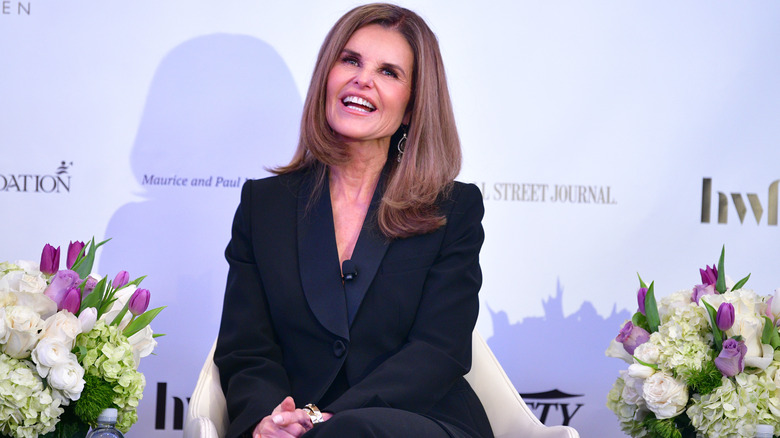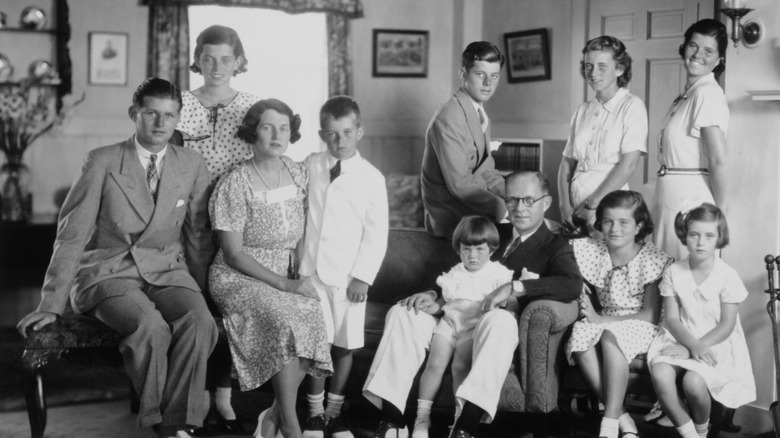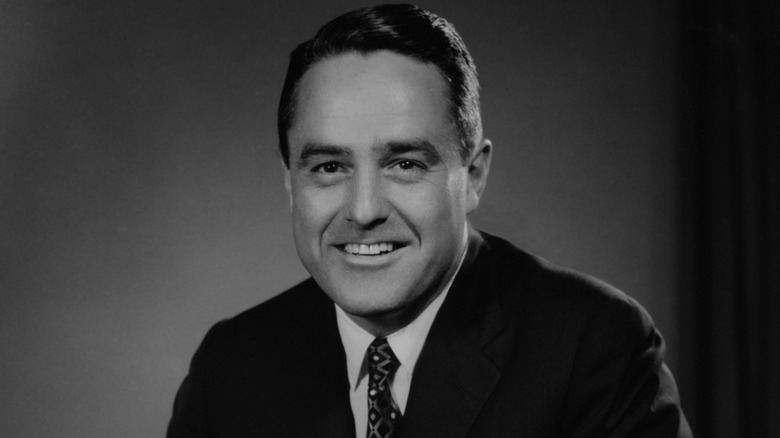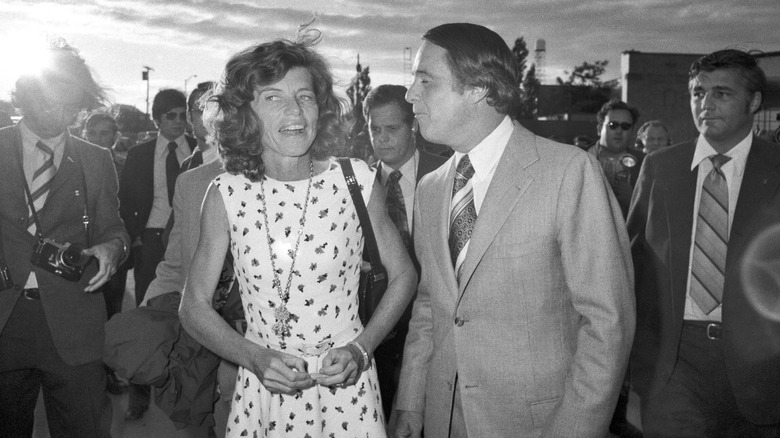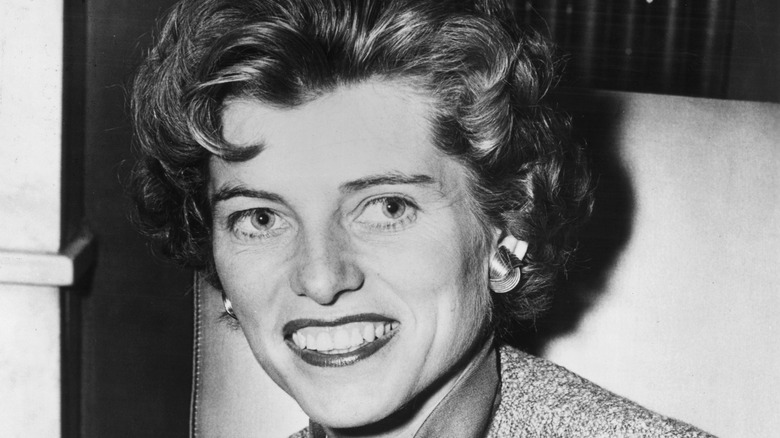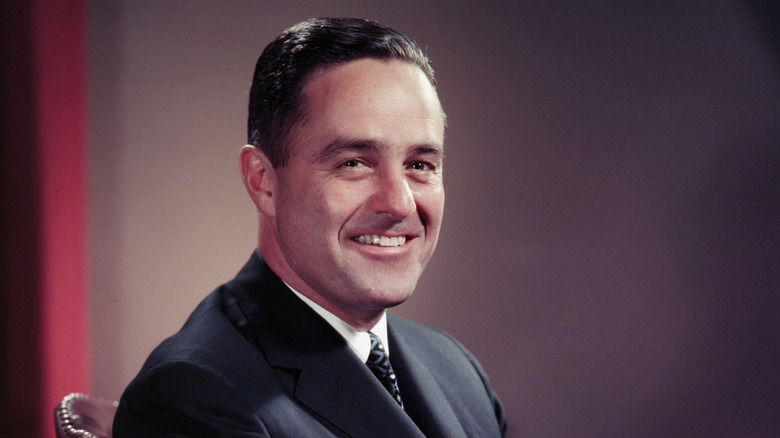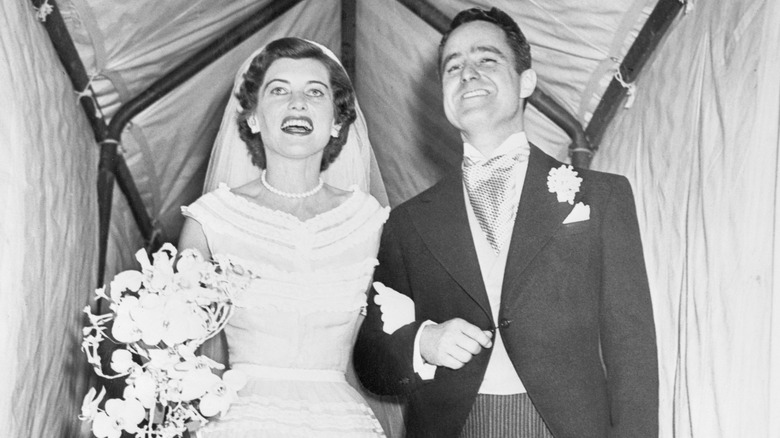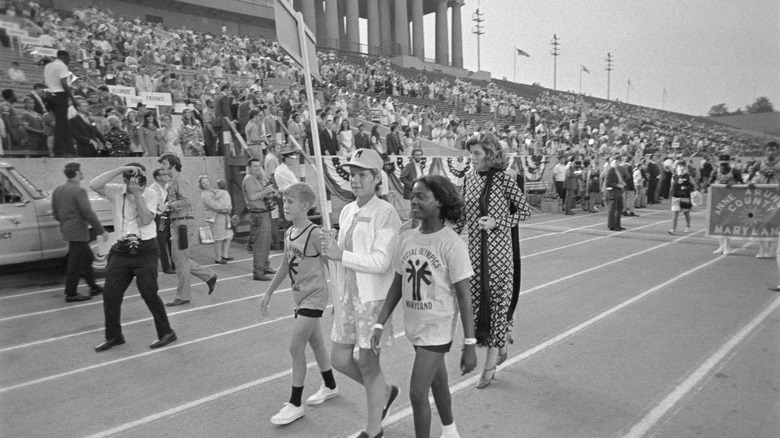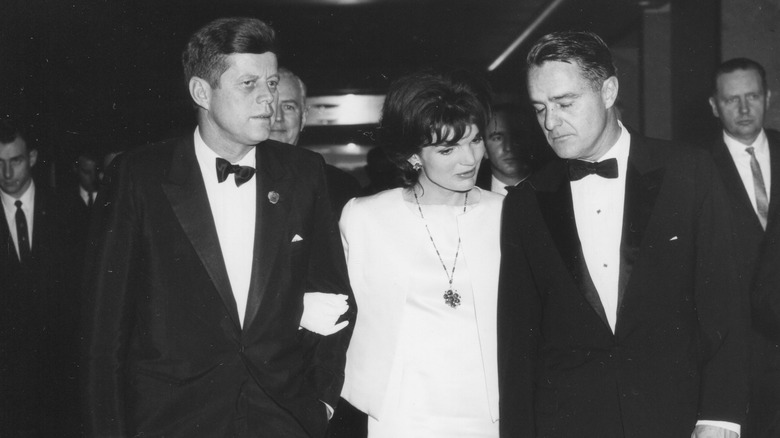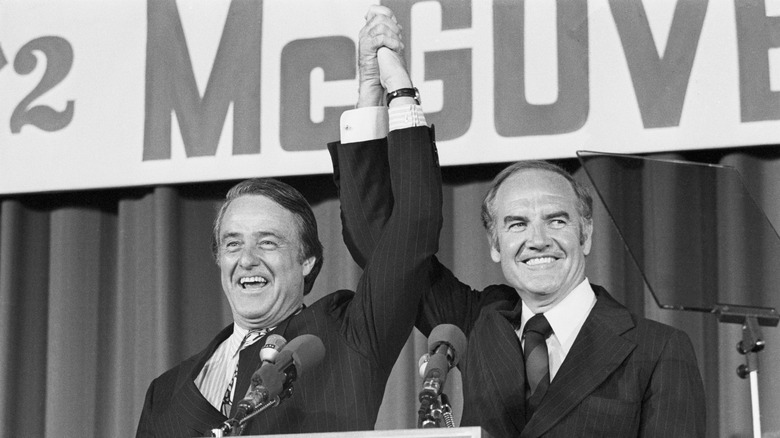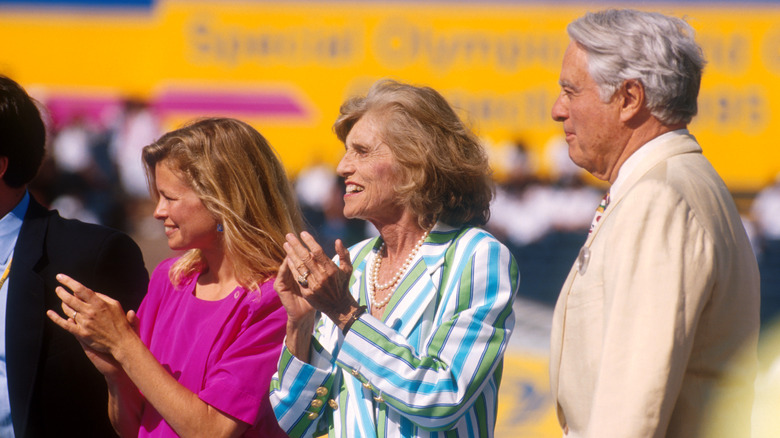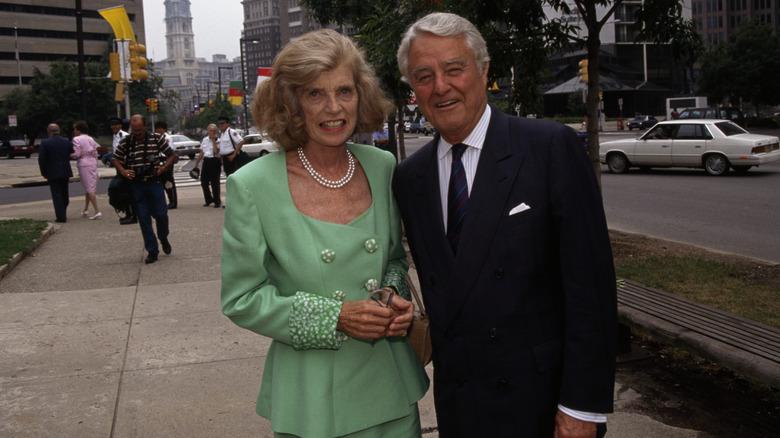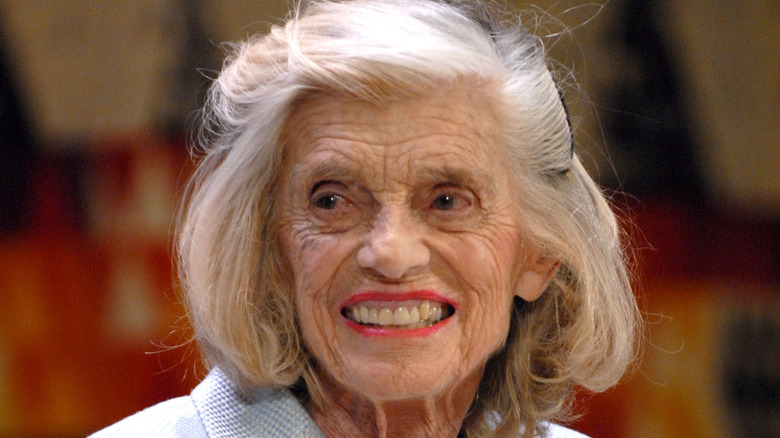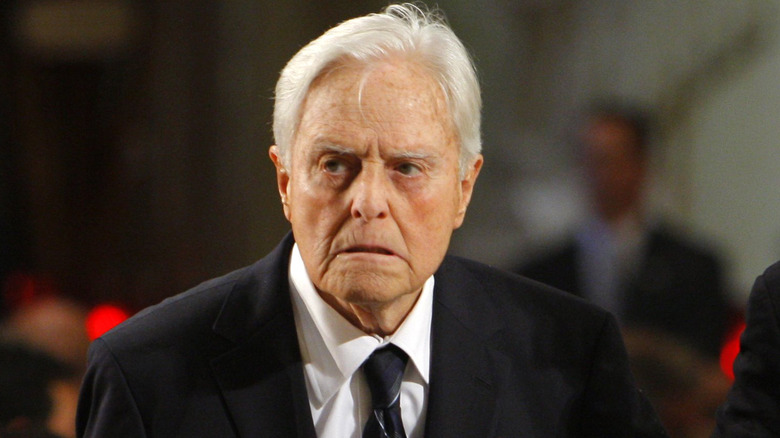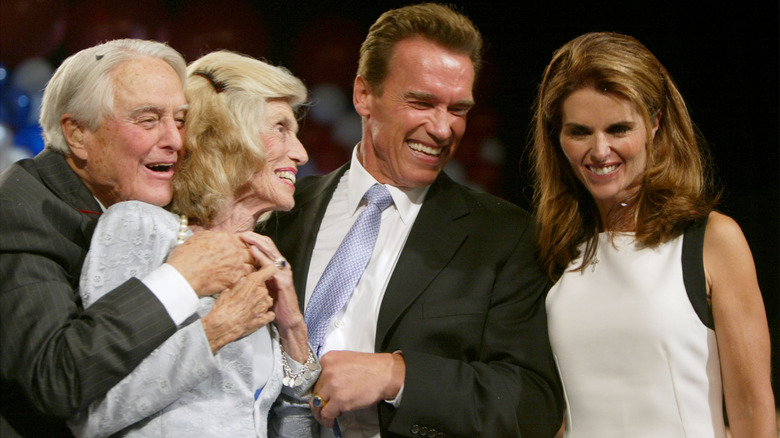Who Were Maria Shriver's Parents, Eunice And Sargent?
Maria Shriver is best known as a journalist, author, activist, and the former First Lady of California in the early 2000s when she was still married to actor and bodybuilder turned politician, Arnold Schwarzenegger. However, her parents, Eunice Kennedy Shriver and Robert "Sargent" Shriver Jr., were just as influential as their famous daughter.
In fact, both of Maria's parents were credited for various works and missions that all centered on changing people's lives for the better. Her mother, Eunice Kennedy Shriver, was a member of the famous (or sometimes infamous) Kennedy family and was able to use her education, passion, and background to help improve the lives of people with disabilities. Maria's father, Sargent Shriver, didn't have the Kennedy name to help him get his start in life, but he nonetheless made his own name for himself via his work in public service which also led him to create key social programs many Americans still use today.
Eunice was John F. Kennedy's sister
Eunice Kennedy Shriver was born in 1921 to parents Joseph P. Kennedy and Rose Fitzgerald Kennedy. Her parents had a total of nine children, and Eunice was their third daughter. You might recognize the names of some of her siblings, brothers John F. Kennedy, Robert F. Kennedy, and Edward "Ted" Kennedy, as well as sisters Kathleen "Kick" Kennedy Cavendish and Rosemary Kennedy. While her older brothers John and Robert are arguably the most famous of the siblings, Eunice would go on to create her own legacy outside of the political spectrum.
According to the National Park Service, Eunice worried her parents at first due to her frailty as a child, and the fact that she often got sick. Nevertheless, Eunice also grew up to become an energetic leader who also displayed a great deal of empathy and maturity. Her mother Rose was quoted as describing Eunice as possessing a "highly conscientious demeanor," too. This could partly explain why Eunice was close with older sister Rosemary, who famously had intellectual disabilities and a dangerous lobotomy that left her with permanent damage.
Sargent Shriver was an American politician
While Maria Shriver's mother was born into what would later become a political family, Eunice Kennedy was not interested in entering politics herself. Maria's father, on the other hand, did work in politics for several years. Sargent Shriver was born in Maryland in 1915 to Robert Shriver Sr. and Hilda Shriver. His family didn't have nearly the wealth that the Kennedys had, but Sargent did go on to attend good schools and have a prodigious career.
Aside from public service, one of Sargent's main missions was conflict resolution. This might seem ironic for someone who was involved in politics, but Maria's father can be seen as someone who cared more about leadership and service than the power that typical politicians are perceived to fight over. As his biography on the Sargent Shriver Peace Institute noted, Sargent "worked to build peace by developing and implementing programs and policies structured to promote long-term, cumulative, peaceable change" through what he called "a formula for practical idealism."
Both Eunice and Sargent Shriver attended prestigious schools
Both of Maria Shriver's parents attended prestigious schools. For Eunice Kennedy Shriver, her education started when she was a young girl in primary school. As a teenager, she was considered popular at her school and was also known for her intelligence. If her school had a "most likely to succeed award," chances are Eunice would have won. According to the National Park Service, Eunice attended a Catholic college at the Sacred Heart College in New York City for two years. She then transferred to Stanford University, where she excelled in athletics and academics. Eunice became the first woman in her family to obtain a four-year degree, having earned a bachelor's degree in Sociology.
Sargent Shriver, on the other hand, first attended Canterbury School, which was made possible with the help of a full scholarship, according to the John F. Kennedy Presidential Library and Museum. While he eventually went to Yale University in 1934, Sargent first spent the summer after graduating from Canterbury in Germany thanks to a living-abroad program called the Experiment in International Living. He struggled financially while at Yale, but donations from loved ones and scholarships helped Sargent finish his bachelor's degree. "The most important thing was that he was a scholarship student at Yale," his son, Robert Shriver III later told Yale Daily News in 2011. "People maybe thought because he married my mom that he always had money, but his family lost their money in the Depression."
Eunice had a background in sociology and juvenile justice
Eunice Kennedy Shriver used her degree in sociology from Stanford University and put it to good use. Soon after graduation, she worked for the Department of State, and then as a secretary for the Department of Justice's Juvenile Delinquency Committee starting in 1946. During her time there, she developed a passion for making sure all children had a chance at a successful future. Part of this involved policies she enacted to help reduce high school dropout rates. Later, she worked as a social worker, helping teenage mothers and women who were victims of sexual abuse.
During her early career, Eunice also aspired to further her education. This culminated in a graduate degree in social work, which she earned from the University of Chicago, according to the National Park Service. Not only was Eunice ahead of her time as a woman with a career in social work, but getting a graduate degree as a woman in the 1950s was also uncommon.
Sargent Shriver went to law school and served in the U.S. Navy
Before Maria Shriver's father, Sargent Shriver, met her mother, he obtained his law degree and also served in the U.S. Navy. After graduating with his four-year degree from Yale University in 1938, Sargent went on to attend Yale Law School. He spent some time living abroad once again, this time in France right before World War II broke out in Europe. Ironically, according to the John F. Kennedy Presidential Library and Museum, Sargent enlisted in a summer program with the U.S. Navy while also speaking out against any American involvement in World War II.
However, despite his personal views on the war, Sargent reported for Naval duty in 1941 after he graduated from Yale Law. As the John F. Kennedy Presidential Library and Museum noted, Sargent was assigned to a brand-new ship called the "South Dakota." Aside from his service on battleships, Sargent Shriver also worked on a submarine.
Maria Shriver's parents married in 1953
Eunice Kennedy Shriver and Sargent Shriver first met in Manhattan where they were both working. Sargent himself landed a job with Eunice's father's company, JPK Enterprises, according to the John F. Kennedy Presidential Library and Museum. The couple got to know each other more in Chicago. Here, Eunice was working for both the Chicago Juvenile Court and the domestic violence organization House of the Good Shepherd. She met Sargent when he started working at her father's place of business around that time. Sargent also helped Eunice with some of her projects.
Eunice and Sargent got married in May 1953. The nuptials took place at St. Patrick's Cathedral in New York City, according to The Palm Beach Post. Maria Shriver is one of the five children the couple went on to have, though Maria is their only daughter. She's also the second eldest sibling. Her four brothers are Robert Shriver III, Timothy Shriver, Mark Shriver, and Anthony Shriver.
Eunice founded the Special Olympics
In the late 1950s, Eunice Kennedy Shriver's interests shifted to working for children with intellectual disabilities, which was partly inspired by her sister, Rosemary Kennedy. According to the John F. Kennedy Presidential Library and Museum, Eunice became the Director of the Joseph P. Kennedy Jr. Foundation in 1957. The organization was originally established in 1946 as a tribute to her late eldest brother, Joseph Kennedy, and was intended to help improve the lives of individuals with intellectual disabilities.
It would seem that Eunice found her true calling in her work with intellectual disabilities. After her directorship with the Joseph P. Kennedy Jr. Foundation, she went on to establish a camp in 1962 that was designed for children and adults with intellectual disabilities, which was held in her own home. During this summer day camp, which was called "Camp Shriver," Eunice worked with participants on athletic abilities and a variety of sports. This eventually led to Eunice's founding of the Special Olympics in 1968.
At the inaugural ceremony, Eunice declared that sports can make a difference in the lives of children with intellectual disabilities. According to her official biography on the organization's website, Eunice was quoted as saying that "through sports they can realize their potential for growth." The Special Olympics now has 6 million participants from 200 different countries.
Sargent Shriver's work for John F. Kennedy led to the creation of the Peace Corps
During the 1950s, Sargent Shriver helped work on John F. Kennedy's presidential campaign. According to the John F. Kennedy Presidential Library and Museum, Sargent was also tasked with helping President Kennedy find talent for key positions in his administration. In return, President Kennedy helped establish the Peace Corps, which was Sargent's idea and passion. He was the organization's first director between 1961 and 1966. Before this, while Sargent and Eunice Kennedy Shriver were still living in Chicago, he worked for the Chicago Board of Education and also worked on desegregation efforts in public schools.
While he directed the Peace Corps, Sargent made numerous trips to different regions of the world as he helped spread the organization's initiative. He also gave speeches at schools, businesses, and political events. According to the organization's official website, the Sargent Shriver Peace Institute, Sargent proudly reported around the time of the program's launch, "We received more letters to work for the Peace Corps, which did not then exist, than for all other existing agencies." To date, over 220,000 Peace Corps volunteers have worked in nearly 150 countries. "In the Peace Corps, in the War on Poverty, we've learned that the challenge before America today is not to become richer or bigger or stronger, but to become more human," Yale Daily News also reported Sargent as saying at a speech in 1967.
Sargent Shriver spent several years in national public service
Aside from his creation of the Peace Corps in 1961 with President John F. Kennedy, Sargent Shriver used his skills and ambitions to improve the lives of others through a long career in national public service. This included several posts in the Lyndon B. Johnson administration such as the French ambassador, as well as the Director of the Office of Economic Opportunity. According to the Sargent Shriver Peace Institute, Sargent notably helped create the War on Poverty, which eventually led to key social programs such as Head Start and the Community Action Program.
In the 1970s, Sargent Shriver sought elected office. First, he was the vice presidential nominee for the Democratic ticket in 1972, along with presidential nominee George McGovern. However, according to The American Presidency Project, the McGovern-Shriver ticket only won 17 electoral votes and 37.5% of the popular vote, losing to Richard Nixon and Spiro Agnew. In 1976, Sargent had a brief run as a presidential candidate himself, along with 16 others vying for the position, as reported by Politico. Ultimately, Jimmy Carter won the Democratic Primary and went on to beat Gerald Ford. After this, Sargent didn't run for any other political positions and instead focused on other ways to serve the public.
Sargent Shriver also worked for the Special Olympics
While Maria Shriver's mother, Eunice Kennedy Shriver, is known for founding of the Special Olympics, her father Sargent Shriver was also heavily involved in the organization. In fact, he became the organization's president in 1984, and then later became Chairman of the Board in 1990.
Sargent served as Chairman until his health took a turn in 2003. Nevertheless, his impact on the Special Olympics can likely be felt today, due to Sargent's ability to use his skills and connections to help expand his wife's original vision on a more global scale. "He was a tireless ambassador for change: passionate, optimistic, energetic, vigorous, and always joyful," the Special Olympics' Director of International Programs, Jamie Kirkpatrick, was quoted as saying via the Sargent Shriver Peace Institute. "In many countries, he literally opened the door for athletes, families, and volunteers, breaking down barriers of language and cultures while offering a new vision of achievement, inclusion, and love. These travels always seemed to renew Sarge; the world was his stage and he loved making it a better place for all of us."
Both of Maria Shriver's parents were recipients of the Presidential Medal of Freedom
President Ronald Reagan honored Eunice Kennedy Shriver with the Presidential Medal of Freedom in 1984. She also received several other awards throughout her life for her work for children and intellectual disabilities. These included the United States Sports Academy's Eagle Award in 1990, the 1992 Jefferson Awards' annual Award for Greatest Public Service Benefitting the Disadvantaged, and many others as outlined by the John F. Kennedy Hyannis Museum. According to the Special Olympics, Eunice also received a posthumous Arthur Ashe Award for Courage in 2017 at the annual ESPYS awards ceremony. Her son, Timothy Shriver, who is the current leader of the Special Olympics, accepted the award on her behalf.
Sargent Shriver also received the Presidential Medal of Freedom. President Bill Clinton awarded him with the award in 1994. Like his wife Eunice, Sargent also received numerous awards for his lifetime of work. According to the Sargent Shriver Peace Institute, these included Veteran of the Year, the James J. Hooey Award, and the Distinguished American Award, just to name a few.
Eunice Kennedy Shriver died in 2009
Maria Shriver's mother, Eunice Kennedy Shriver died in 2009. Eunice had also suffered from strokes in the years leading up to her death in August of that year. According to NBC News, Eunice was surrounded by her five children, including Maria, as well as her husband, Sargent Shriver, and their 19 grandchildren at the time of her death at Cape Cod Hospital. She was 88 years old. The Shriver family said in a statement, as quoted by NBC News, "She was the light of our lives ... We have always been honored to share our mother with people of good will the world over who believe, as she did, that there is no limit to the human spirit."
Interestingly, though Eunice had the courage and strength to go out and make a difference in the world, she previously acknowledged that the changes she made with the Special Olympics were credited to the fact that she had witnessed and experienced rejection in her life. According to Stanford Magazine, the publication of her alma mater, Eunice had said in a 2007 speech that it was the rejection that made her believe she "make a difference in a positive direction."
Sargent Shriver died in 2011
Sargent Shriver was first diagnosed with Alzheimer's disease, a common type of dementia, in 2003. He died in January 2011 after a long battle with the disease at the age of 95. "He was a man of giant love, energy, enthusiasm, and commitment," said the Shriver family, as reported by ABC News. "He worked on stages both large and small but in the end, he will be best known for his love of others."
His alma mater Yale University also summed up Sargent's life as a compassionate activist who wanted to improve the lives of others. "Human life is too valuable to be wasted by war or by poverty or by indifference," Yale Daily News quoted Sargent as previously saying. "But we sometimes seem to be doing exactly that — not knowingly, not willfully perhaps — but simply because we often live in a value vacuum ... If these are problems that are bothering you, they are the same ones that are bothering me, also. The question is, what can we do about it?" His daughter, Maria Shriver, has also applied this sentiment to her own life, as much of her activism has to do with Alzheimer's disease, as inspired by Sargent.
Long after their deaths, Maria Shriver continues to honor her parents' legacies
Eunice Kennedy Shriver and Sargent Shriver dedicated their lives to helping others, and they seemed to instill these passions in their children, including Maria Shriver. While her parents were still alive, and long after their respective deaths, Maria continued her own social activism while also honoring her parents' work. This includes Alzheimer's disease awareness, working for the betterment of others, and more.
As Maria wrote on her personal website, "My own journey has been full of twists and turns. At times, I have felt certain, and then uncertain. But throughout it all, one thing has always been constant: My faith and my passion to make a difference and be of service to my family, my community and to the world." Part of this work includes her research in Alzheimer's disease and founding The Women's Alzheimer's Movement. She also continues volunteering for the Special Olympics, which her mother Eunice founded and was involved in for the rest of her life.
